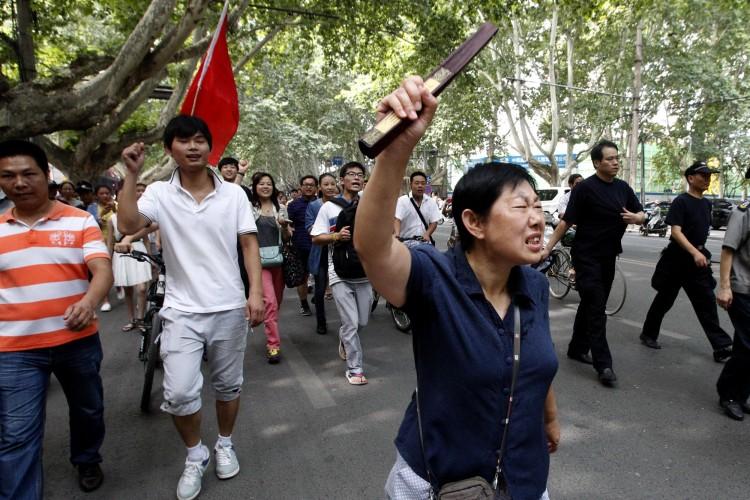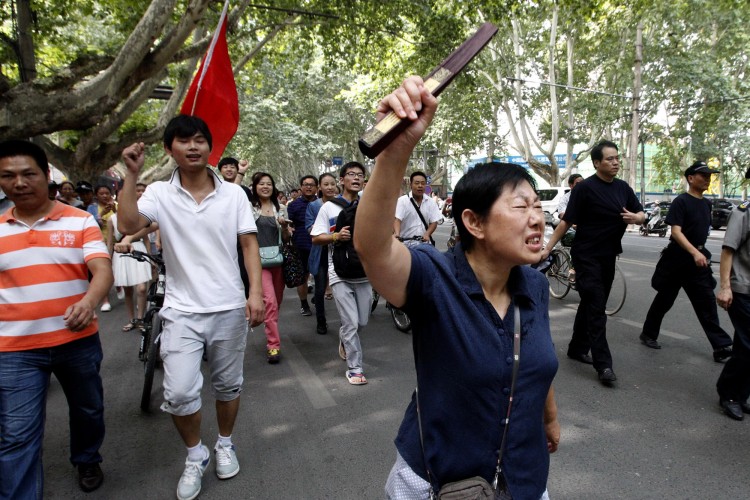Mass anti-Japan protests took place in more than 10 cities across China recently, including Beijing, Jinan, Qingdao, Guangzhou, Shenzhen, Taiyuan, and Hangzhou. The demonstrators were incensed over the recent dispute with Japan over the Senkaku Islands, an uninhabited, rocky set of isles that has been the site of competing territorial claims recently.
Chinese activists stormed the island recently and Japanese coast guards arrested them. Not long after they were gone, a group of nationalistic Japanese themselves staged a landing.
In Guangzhou, large groups of people holding Chinese flags and banners and shouting slogans staged a sit-in outside the Japanese consulate on Sunday morning, and then walked the streets in a protest parade. Banners carried nationalistic messages like: “Fight to the death to defend the Chinese territory Diaoyu Islands,” using the Chinese name to refer to the land mass.
In Shenzhen a crowd turned over a Japanese-brand police car and struck it with iron bars. Anti-Japanese demonstrators also attacked a Japanese restaurant nearby.
In Chengdu, Sichuan Province, beginning at 10:00 a.m. on Aug. 19, dozens of students rallied and held banners. Local authorities dispatched over 2,000 police to block the protesters.
Two thousand people protested in downtown Jinan, Shandong Province, displaying signs that read, “Stay awake to Japanese militarism,” “China’s Diaoyu Islands cannot be invaded,” “The Diaoyu Islands are China’s inherent territory,” etc.
According to the state-run China News Service, Japanese national flags and photos of Japanese Prime Minister Yoshihiko Noda were burned during the demonstration in Jinan.
Although Xinhua reported on the protests, CCTV’s flagship “News Broadcast” remained silent. Posts were deleted and access restricted related to the topic on Sina Weibo, a popular microblogging platform.
Some online commentators have wondered whether the protests were in part manipulated by the Chinese Communist Party, as a way of using nationalistic sentiment to enhance its own legitimacy as a defender of Chinese national integrity.
Boxun, an overseas Chinese dissident media, quoted an official involved in propaganda work saying that the CCP “uses the pretext of protecting the Diaoyu Islands to incite patriotism, aiming to occupy a high place in the public and to suppress attention on the Internet from issues at home and abroad, especially negative reports, about the 18th National Congress.” Such insider remarks, regularly published on Boxun, are impossible to verify.
Others saw in the protests are particular irony of modern China. On his blog, legal expert Zhao Guojun wrote that the only real cause for anti-Japan sentiment these days should be that it was the Japanese occupation of China in the 1930s and 1940s that ultimately led to the CCP’s ruling of the country. “Since then the Chinese people have suffered the greatest misfortune. Only for this should there be anti-Japanese sentiment.”
Widely forwarded remarks on Weibo, of unknown provenance, said: “When Chinese land on the Diaoyu Islands, Japan shackles them away. When Japanese land on the Diaoyu Islands, Chinese smash Chinese cars. Instead of boycotting Japanese goods, boycott the idiots first.”
The Epoch Times publishes in 35 countries and in 19 languages. Subscribe to our e-newsletter.





